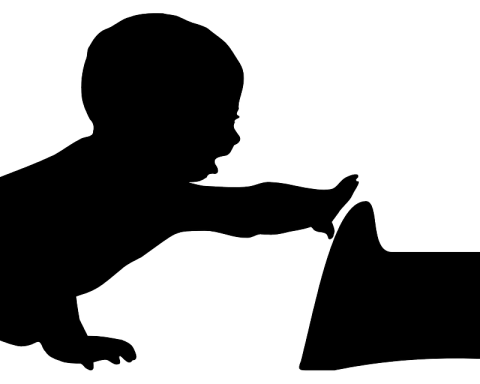While gas can cause discomfort and pain in babies, colic is more intense. Colic in babies causes prolonged crying episodes that may be associated with severe abdominal pain. Gas, on the other hand, is a general term, and it can be a symptom of colic.
Gas versus Colic
Colic generally makes its appearance in the second or third week after birth. When a baby is simply gassy, giving the baby gripe water, massaging the baby’s belly and back, and moving his or her legs in a cyclic motion provide quick relief. However, colic pain is far more acute and longer lasting.
A baby’s incessant crying due to gas can be overwhelming for new parents, particularly if the baby remains inconsolable for a long time despite the parents’ best efforts. However, when a baby cries inconsolably, draws his or her legs toward the stomach, and arches his or her back, the discomfort may be due to colic rather than gas.
The excessive crying in a child with infantile colic could be regarded as merely the extreme end of normal crying. —Alan M. Lake, Journal of Pediatric Gastroenterology and Nutrition
In colic, each crying episode lasts for three to four hours, followed by three to four hours of respite before another crying episode begins. This crying cycle seems never-ending, and its intensity appears to increase over time. Also, colic tends to strike in the afternoon and at night, and almost never before noon. The baby appears to be in pain, but the source of the pain is unknown and nothing seems to relieve it.
Colic is a common condition in babies. Distinguishing colic from gas helps parents deal with their babies’ discomfort more effectively. Adequate knowledge and a reliable parenting strategy can help parents and their children survive the colic phase.
Possible Reasons for Colic
The origin of colic pain is often mysterious. According to research, “infantile colic is common during the first months of life, but its cause is unknown.” Some possible causes of colic include:
- Some pediatricians believe that colicky babies suffer from environmental overstimulation because the nervous system is still developing.
- The digestive system is also still maturing at this stage. Excessive movement of the intestines can make babies irritable.
- The development of other normal bodily functions can make babies uncomfortable.
How to Treat Colic: Parenting Strategy
Dealing with colic can be extremely tricky because one particular treatment may work for one baby but not another. It’s also possible that a treatment can work one day but then doesn’t work the next day. Even colic drops and simethicone don’t work well on every colicky baby. So, an effective parenting strategy is needed.

One research study offers the following advice: “Infantile colic should preferably be treated by advising carers to reduce stimulation and with a one week trial of hypoallergenic formula milk.”
Other research concluded, “a major cause of colic is the misinterpretation of infant cries leading to ineffective responses, and that this can be managed by counseling parents on how to respond to infant crying.”
Parents can use the following tips to treat colic in their baby:
- Rub the baby’s back and stomach.
- Hold the baby closely in an upright position and rock the baby in a quiet and relatively dark room.
- Play white noise in the background. For example, parents can run a fan, play radio static, or turn on a vacuum.
- Massage the baby with an herb-infused oil like lavender or chamomile.
- Give the baby a warm bath.
- If nothing else works, take the baby out for a car ride.
The key to managing colic is lots of patience and love. Parents should keep on trying different strategies since most colic remedies don’t provide immediate relief but rather start working after weeks of administration.
The good news is that colic starts improving in the third month and goes away completely by the fourth or fifth month.
The Need for Self-Care for Parents of Colicky Babies
It is extremely exhausting to care for a crying and inconsolable infant day after day. Thus, parents need to look after themselves and rest whenever they can. New mothers, in particular, need more help at this stage because they are already worn out from the delivery.
Some research that explored the impact of infant colic on the emotional state of the mother found that “all mothers experienced physical and psychological symptoms in response to their infant’s colic. More than 90% of the mothers with a colicky infant experienced significant marital tension and disruption in their social contact.”
A parenting strategy based on behavioral therapy and support can help parents during the colic phase so that they are better able to take care of the needs of their colicky baby.
References:
- Walker, W. A., P. R. Durie , J. R. Hamilton, eds. Pediatric Gastrointestinal Disease: Pathophysiology, Diagnosis, and Management. Philadelphia: Decker, 1991. Retrieved from https://journals.lww.com/jpgn
- Lucassen, P. L. B. J., W. J. J. Assendelft, J. W. Gubbels, J. T. M van Eijk, W. J. van Geldrop, and A. Knuistingh Neven. “Effectiveness of Treatments for Infantile Colic: A Systematic Review.” BMJ 316, no. 7144 (1998): 1563–1568. Retrieved from http://www.bmj.com/content
- Taubman, Bruce. “Clinical Trial of the Treatment of Colic by Modification of Parent-Infant Interaction.” Pediatrics 74, no. 6 (1984): 998–1003. Retrieved from http://pediatrics.aappublications.org
- Levitzky, Susan, and Robyn Cooper. “Infant Colic Syndrome—Maternal Fantasies of Aggression and Infanticide.” Clinical Pediatrics 39, no. 7 (2000): 395–400. Retrieved from http://journals.sagepub.com













